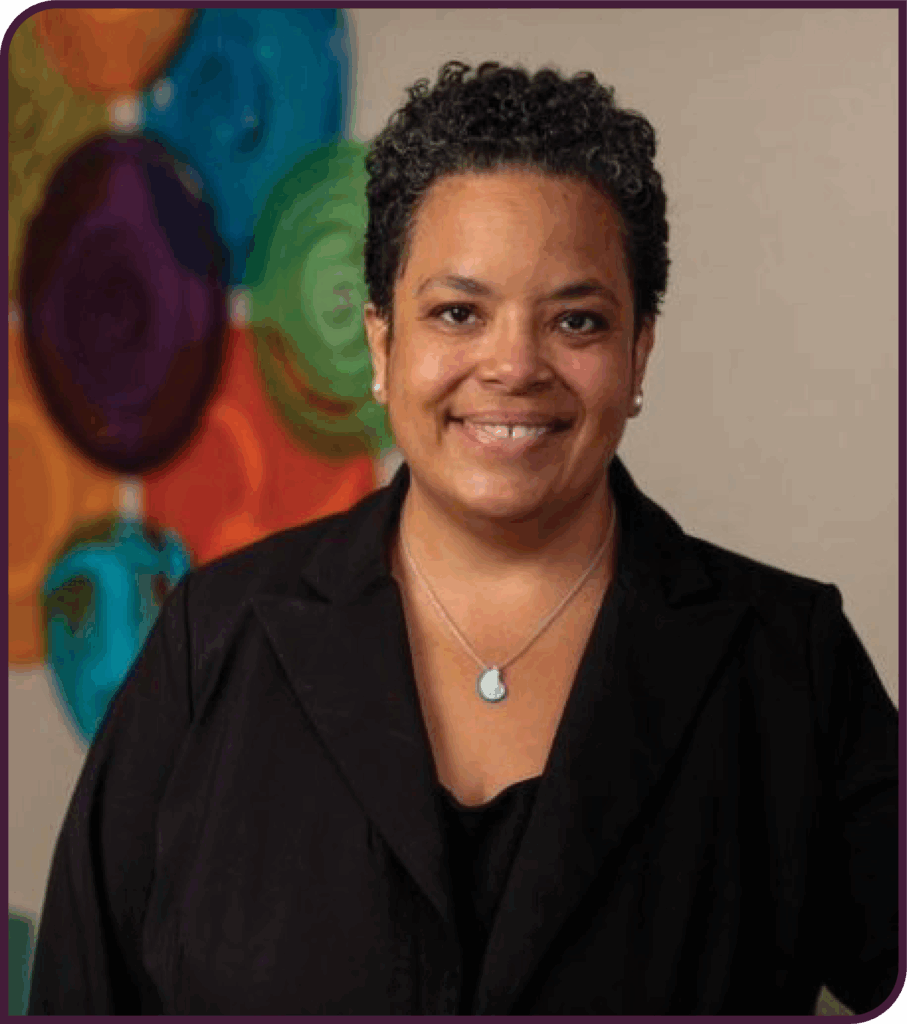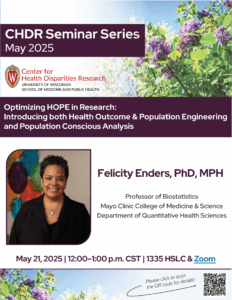
- This event has passed.
CHDR Seminar Series Presents Dr. Felicity Enders
Please join us to welcome Felicity Enders, PhD, MPH
as our featured Seminar Series speaker on May 21, 2025!
 Optimizing HOPE in Research: Introducing both Health Outcome & Population Engineering and Population Conscious Analysis
Optimizing HOPE in Research: Introducing both Health Outcome & Population Engineering and Population Conscious Analysis
Dr. Felicity Enders is a Professor of Biostatistics at Mayo Clinic. She is a consulting statistician with over 180 publications, an H-index >60, and an I-100 of 25. Dr. Enders’ personal research focuses on educating researchers. For about 15 years, this took the form of statistics education, in which she leveraged her award-winning expertise as a statistics educator to develop a national statistics education research team. While this team is ongoing, her research interests have evolved to equity.
As the Associate Director of the Mayo Clinic Center for Clinical and Translational Science (funded by NCATS), Dr. Enders serves as Program Director for Mayo’s PhD program in Clinical and Translational Science (funded by NCATS). Dr. Enders also serves as the Director of the Mayo Clinic Office for Research Belonging and the Deputy Director for People and Culture in the Mayo Clinic Comprehensive Cancer Center. She is MPI for the Center for Chronic Disease Reduction and Equity Promotion Across Minnesota (C2DREAM, funded by NIMHD) and Program Director for the Minnesota Learning Health System K12 program (MN-LHS, funded by AHRQ).
Dr. Enders’ expertise has been recognized nationally with multiple awards, including the 2021 Distinguished Achievement Award from the Section on the Teaching of Statistics in the Health Sciences in the American Statistical Association, the 2023 Publication Award from the Journal of Clinical and Translational Science for her initial paper on the hidden curriculum in research, and the 2024 Lifetime Achievement Award from the Justice, Equity, Diversity, and Inclusion group in the Association for Clinical and Translational Science. She is a member of the Advisory Committee for the Encoding Equity Alliance through the Council of Medical Specialty Societies, an elected fellow in the American Statistical Association, and a member of the board of directors for the Association for Clinical and Translational Science. In 2025, Dr. Enders was named as President-elect for the Association for Clinical and Translational Science.
About the Talk

With changes to research nationally, scientists seek new tools to provide hope in a new environment. In response, Dr. Enders will introduce the topic of differential impact and illustrate this framework with two examples, health outcome and population engineering (HOPE) and population conscious analysis.
HOPE is a new framework to rethink medicine and research. Patients may be exposed to chronic stress, which can lead to accelerated biological aging and early morbidity and mortality. However, this has not yet been incorporated into medical practice. With HOPE, Dr. Enders proposes we proactively identify people at risk of accelerated aging with the goal of intervening to improve health outcomes. The screening can be done through a brief survey assessing lifetime stress or using geocoded home address data. As no suitable survey currently exists, Dr. Enders has developed one and will present early results.
Population conscious analysis focuses on social demographic variables, which are used pervasively across research. This is appropriate when used to assess inclusion and describe study populations. However, such variables are also used as predictor variables. This practice is so frequent it is nearly automatic, yet it is deeply flawed. Dr. Enders will illustrate this with the race variable. Race is not a biological variable; as such, when we reflexively include race as a predictor variable, it inadvertently acts a proxy for differences often observed by race within our society. Current analytic practices risk developing clinical calculators and other models that include race-ethnicity as a predictor variable, thereby embedding structural racism into both research and the medical practices that evolve based on research. Population conscious analysis defines new analytic best practices to resolve this conundrum.
This hybrid event will take place in person in HSLC Room 1335 and via Zoom. Lunch will be provided for in-person attendees.
Registration is appreciated but not required.
Register Here
We hope to see you on May 21!
About the CHDR Seminar Series
Held four times per year, the purpose of the CHDR Seminar Series is to provide a focused learning opportunity and promote competency in health disparities research. These invited talks feature both rising and accomplished experts from across the disciplinary spectrum whose current work in health disparities research demonstrates a variety of models, approaches, and frameworks critical for working toward a shared goal of eliminating health disparities.